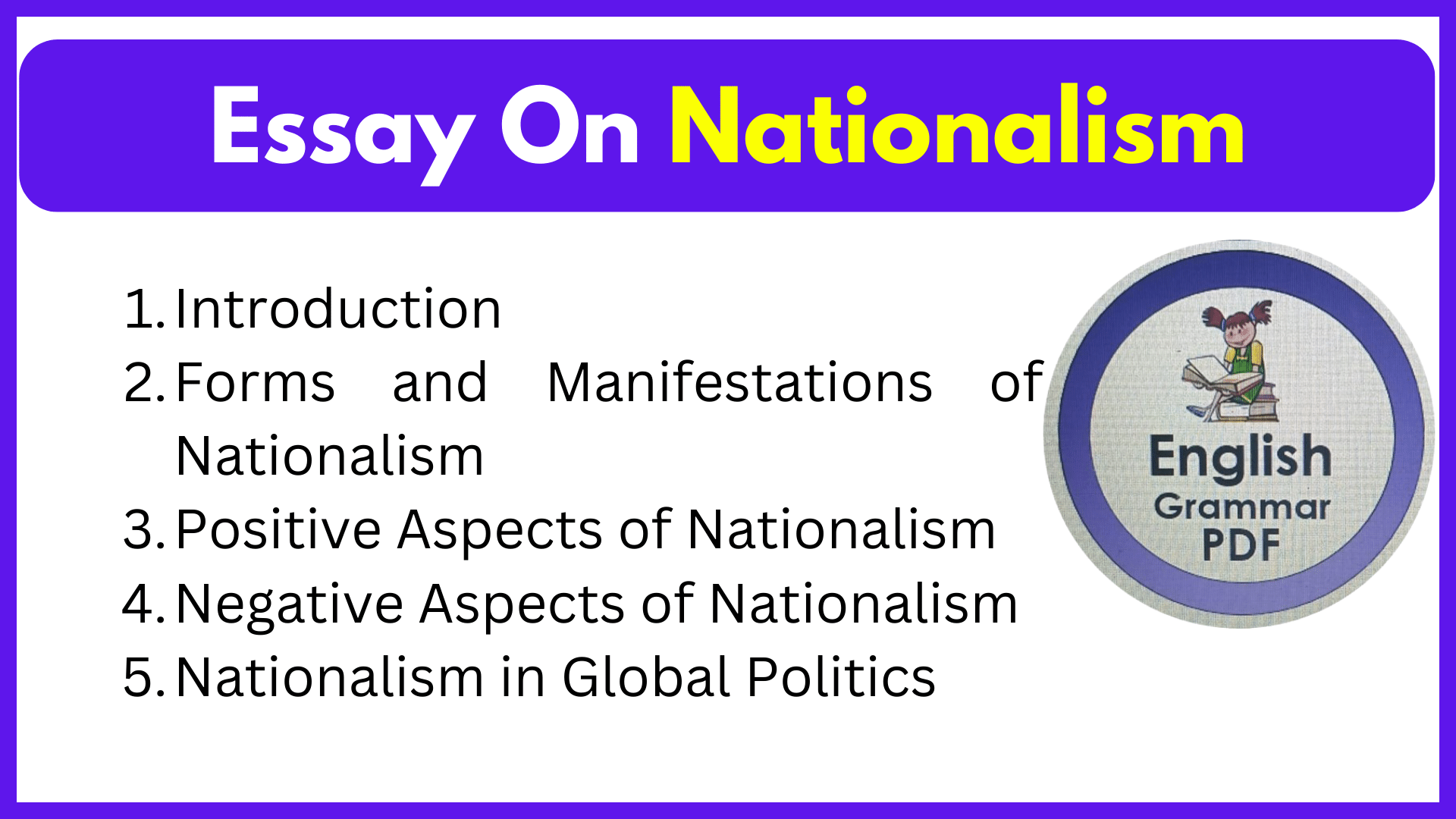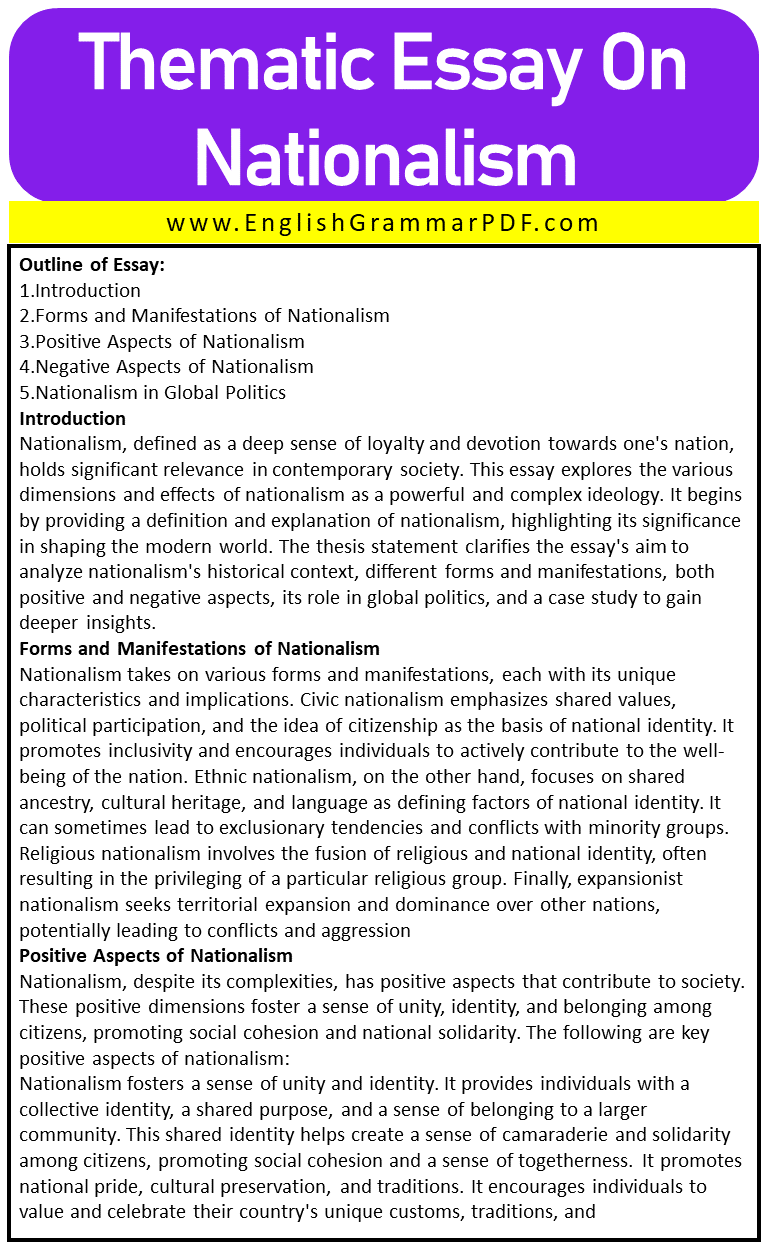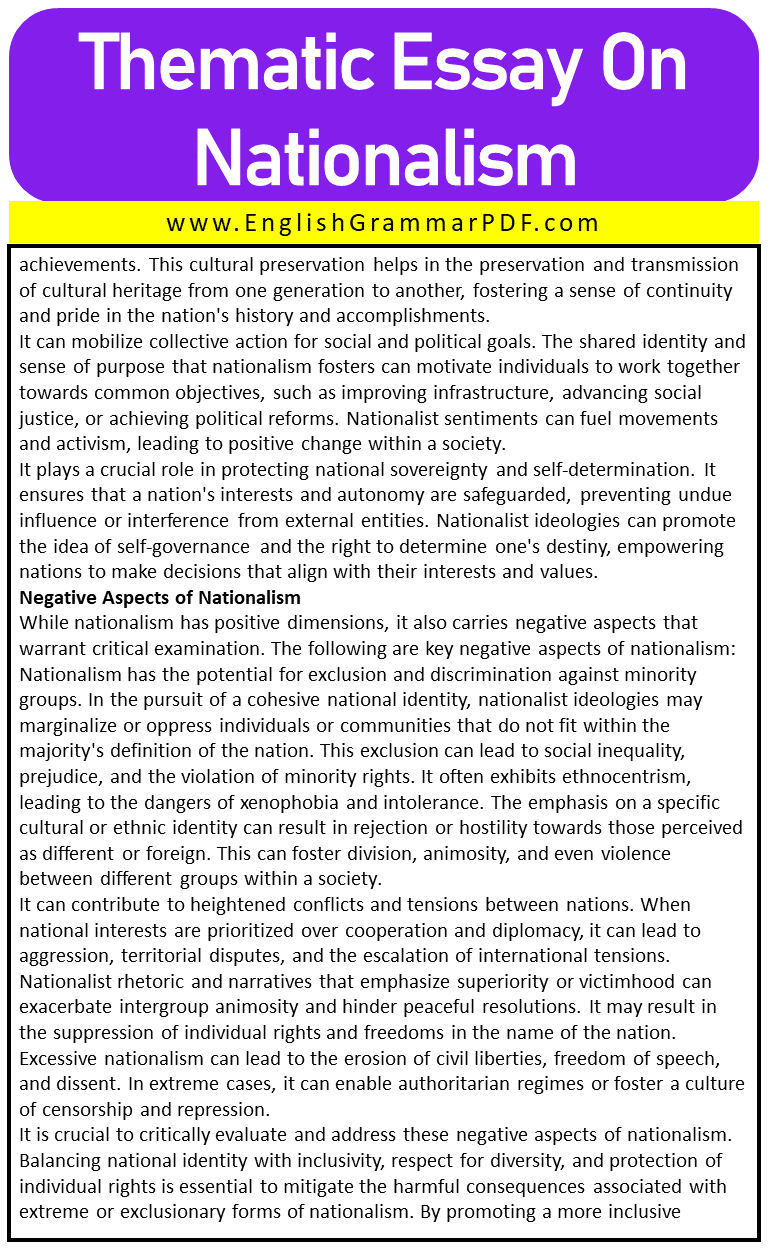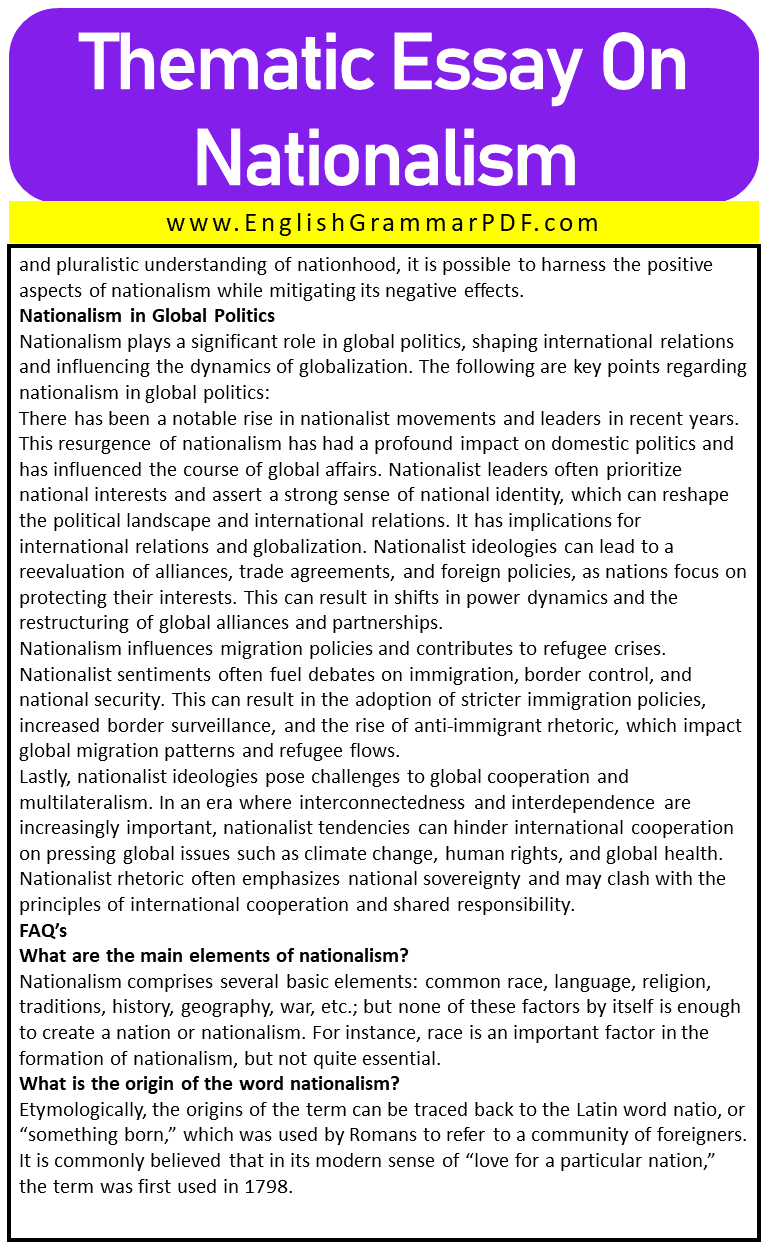Thematic Essay On Nationalism
Outline of Essay:
- Introduction
- Forms and Manifestations of Nationalism
- Positive Aspects of Nationalism
- Negative Aspects of Nationalism
- Nationalism in Global Politics
Introduction
Nationalism, defined as a deep sense of loyalty and devotion towards one’s nation, holds significant relevance in contemporary society. This essay explores the various dimensions and effects of nationalism as a powerful and complex ideology. It begins by providing a definition and explanation of nationalism, highlighting its significance in shaping the modern world. The thesis statement clarifies the essay’s aim to analyze nationalism’s historical context, different forms and manifestations, both positive and negative aspects, its role in global politics, and a case study to gain deeper insights.
Forms and Manifestations of Nationalism
Nationalism takes on various forms and manifestations, each with its unique characteristics and implications. Civic nationalism emphasizes shared values, political participation, and the idea of citizenship as the basis of national identity. It promotes inclusivity and encourages individuals to actively contribute to the well-being of the nation. Ethnic nationalism, on the other hand, focuses on shared ancestry, cultural heritage, and language as defining factors of national identity. It can sometimes lead to exclusionary tendencies and conflicts with minority groups. Religious nationalism involves the fusion of religious and national identity, often resulting in the privileging of a particular religious group. Finally, expansionist nationalism seeks territorial expansion and dominance over other nations, potentially leading to conflicts and aggression
Positive Aspects of Nationalism
Nationalism, despite its complexities, has positive aspects that contribute to society. These positive dimensions foster a sense of unity, identity, and belonging among citizens, promoting social cohesion and national solidarity. The following are key positive aspects of nationalism:
Nationalism fosters a sense of unity and identity. It provides individuals with a collective identity, a shared purpose, and a sense of belonging to a larger community. This shared identity helps create a sense of camaraderie and solidarity among citizens, promoting social cohesion and a sense of togetherness. It promotes national pride, cultural preservation, and traditions. It encourages individuals to value and celebrate their country’s unique customs, traditions, and achievements. This cultural preservation helps in the preservation and transmission of cultural heritage from one generation to another, fostering a sense of continuity and pride in the nation’s history and accomplishments.
It can mobilize collective action for social and political goals. The shared identity and sense of purpose that nationalism fosters can motivate individuals to work together towards common objectives, such as improving infrastructure, advancing social justice, or achieving political reforms. Nationalist sentiments can fuel movements and activism, leading to positive change within a society.
It plays a crucial role in protecting national sovereignty and self-determination. It ensures that a nation’s interests and autonomy are safeguarded, preventing undue influence or interference from external entities. Nationalist ideologies can promote the idea of self-governance and the right to determine one’s destiny, empowering nations to make decisions that align with their interests and values.
Negative Aspects of Nationalism
While nationalism has positive dimensions, it also carries negative aspects that warrant critical examination. The following are key negative aspects of nationalism:
Nationalism has the potential for exclusion and discrimination against minority groups. In the pursuit of a cohesive national identity, nationalist ideologies may marginalize or oppress individuals or communities that do not fit within the majority’s definition of the nation. This exclusion can lead to social inequality, prejudice, and the violation of minority rights. It often exhibits ethnocentrism, leading to the dangers of xenophobia and intolerance. The emphasis on a specific cultural or ethnic identity can result in rejection or hostility towards those perceived as different or foreign. This can foster division, animosity, and even violence between different groups within a society.
It can contribute to heightened conflicts and tensions between nations. When national interests are prioritized over cooperation and diplomacy, it can lead to aggression, territorial disputes, and the escalation of international tensions. Nationalist rhetoric and narratives that emphasize superiority or victimhood can exacerbate intergroup animosity and hinder peaceful resolutions. It may result in the suppression of individual rights and freedoms in the name of the nation. Excessive nationalism can lead to the erosion of civil liberties, freedom of speech, and dissent. In extreme cases, it can enable authoritarian regimes or foster a culture of censorship and repression.
It is crucial to critically evaluate and address these negative aspects of nationalism. Balancing national identity with inclusivity, respect for diversity, and protection of individual rights is essential to mitigate the harmful consequences associated with extreme or exclusionary forms of nationalism. By promoting a more inclusive and pluralistic understanding of nationhood, it is possible to harness the positive aspects of nationalism while mitigating its negative effects.
Nationalism in Global Politics
Nationalism plays a significant role in global politics, shaping international relations and influencing the dynamics of globalization. The following are key points regarding nationalism in global politics:
There has been a notable rise in nationalist movements and leaders in recent years. This resurgence of nationalism has had a profound impact on domestic politics and has influenced the course of global affairs. Nationalist leaders often prioritize national interests and assert a strong sense of national identity, which can reshape the political landscape and international relations. It has implications for international relations and globalization. Nationalist ideologies can lead to a reevaluation of alliances, trade agreements, and foreign policies, as nations focus on protecting their interests. This can result in shifts in power dynamics and the restructuring of global alliances and partnerships.
Nationalism influences migration policies and contributes to refugee crises. Nationalist sentiments often fuel debates on immigration, border control, and national security. This can result in the adoption of stricter immigration policies, increased border surveillance, and the rise of anti-immigrant rhetoric, which impact global migration patterns and refugee flows.
Lastly, nationalist ideologies pose challenges to global cooperation and multilateralism. In an era where interconnectedness and interdependence are increasingly important, nationalist tendencies can hinder international cooperation on pressing global issues such as climate change, human rights, and global health. Nationalist rhetoric often emphasizes national sovereignty and may clash with the principles of international cooperation and shared responsibility.
FAQ’s
What are the main elements of nationalism?
Nationalism comprises several basic elements: common race, language, religion, traditions, history, geography, war, etc.; but none of these factors by itself is enough to create a nation or nationalism. For instance, race is an important factor in the formation of nationalism, but not quite essential.
What is the origin of the word nationalism?
Etymologically, the origins of the term can be traced back to the Latin word natio, or “something born,” which was used by Romans to refer to a community of foreigners. It is commonly believed that in its modern sense of “love for a particular nation,” the term was first used in 1798.
Explore More Essays:
Thematic Essay On Foreign Policy
Download the PDF of the Essay:






